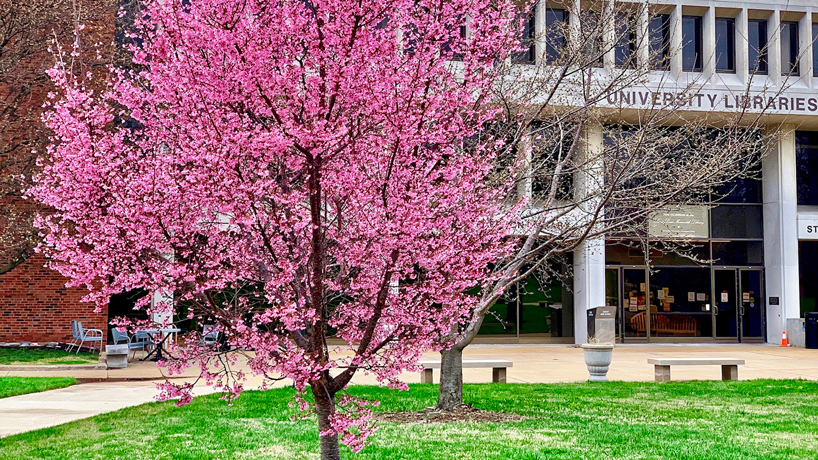
Health, Counseling and Disability Access Services has adjusted its operations to continue serving the needs of students while they’re away from campus. (Photo by August Jennewein)
Chris Sullivan has been following reports from the World Health Organization and Centers for Disease Control and Prevention about the novel coronavirus since December and by February started hearing accounts of the toll it was taking in western Europe from his wife’s family in Italy and his brother living in Spain.
Sullivan, the director of Health, Counseling and Disability Access Services at the University of Missouri–St. Louis, had started preparing for how he and his team might continue to meet the needs of students if and when the virus started disrupting life in St. Louis.
He has still been surprised by the speed at which it has forced his office to alter its operations.
“Our basic model has just been in person, being in the atrium of the Millennium Student Center, being available for crisis walk-ins, doing in-person outreaches,” Sullivan said. “It’s been such a challenge – as what seems like a year goes by in two hours – trying to figure out what does that look like for now?
“We’ve been very thoughtful about how we provide services in different situations, but this is just so far beyond anything we imagined we were going to need to do that we didn’t have any backup plans to fall on. In some respects, we were ready for a disaster, but not a disaster where people need to stay home and can’t be connected.”
The office has been adapting.
Under normal conditions, UMSL’s health services functions as a primary care clinic. Staffed by a nurse practitioner and a physician assistant, students can get treatment for illnesses and injuries and undergo routine physicals and women’s wellness visits. The office can provide vaccinations and basic lab work. It also can provide prescriptions for antibiotics if a student presents with an ear infection or strep throat, and it can refer patients to other sites for X-rays or other more involved examinations or treatments.
To support social distancing, the staff has been connecting with patients by phone, seeing if they can delay less essential appointments such as physicals and talking through more acute issues to determine if they can recommend treatments or remedies.
It presents a challenge when they can’t take a patient’s blood pressure or temperature when evaluating symptoms.
While most staff members have been working virtually from home, there remain a few providers on hand during regular hours should circumstances require an in-person examination and consultation.
“Our healthcare providers are very able to talk through some things,” Sullivan said. “‘Do you have a sore throat?’ ‘You’re not running a fever.’ Just some basic kinds of care. If they need to see somebody, they will.
“We’ve got some protocols in place for people to make sure that they limit their exposure to the environment so that, if someone does have the virus, we can work to contain that and not expose a lot of people to it just because they come into the clinic.”
Sullivan added: “It’s really important to us that we continue to be seen as a valuable and relevant resource for UMSL students. We are here to help.”
Counseling services provides a broad range of services – from individual and group therapy, crisis walk-in services, outreach to promote mental health across campus and trainings to give faculty and staff members some basic tools for working with people distress or students having difficulties.
Those in-person outreach and training efforts have had to be curtailed during the pandemic. But staff members continue to be available over the phone to help with crisis calls and limited availability for in person crisis assistance, and they’re checking in with existing patients and preparing to provide consultation through telehealth tools such as Zoom or FaceTime.
That presents its own challenges because they have to make certain patients have access to the necessary technology to engage in those conversations, and they have to ensure the conversations are private and secure.
“We talk about some pretty intimate stuff in both physical health and mental health,” Sullivan said. “It’s really challenging just trying to get that set up. So we’re working at getting that rolled out right now.”
These changes cannot keep everything running as normal under the circumstances, so staff members need to manage expectations while doing the best they can to meet people’s needs.
“We’re really taking this on as a day-by-day thing,” Sullivan said. “If day-by-day is too much, then we go hour-by-hour. What are the circumstances right now? What do we have available to us right now? We’re constantly reviewing that.
“It’s this balancing between what we can do today and attempting to figure out some things we need to get in place for us to be in a good position to be responsive to the needs in a month or six weeks, depending on how long this thing runs its course and how long it takes.”
For more information on Health, Counseling and Disability Access Services, visit https://www.umsl.edu/hcdas/.














